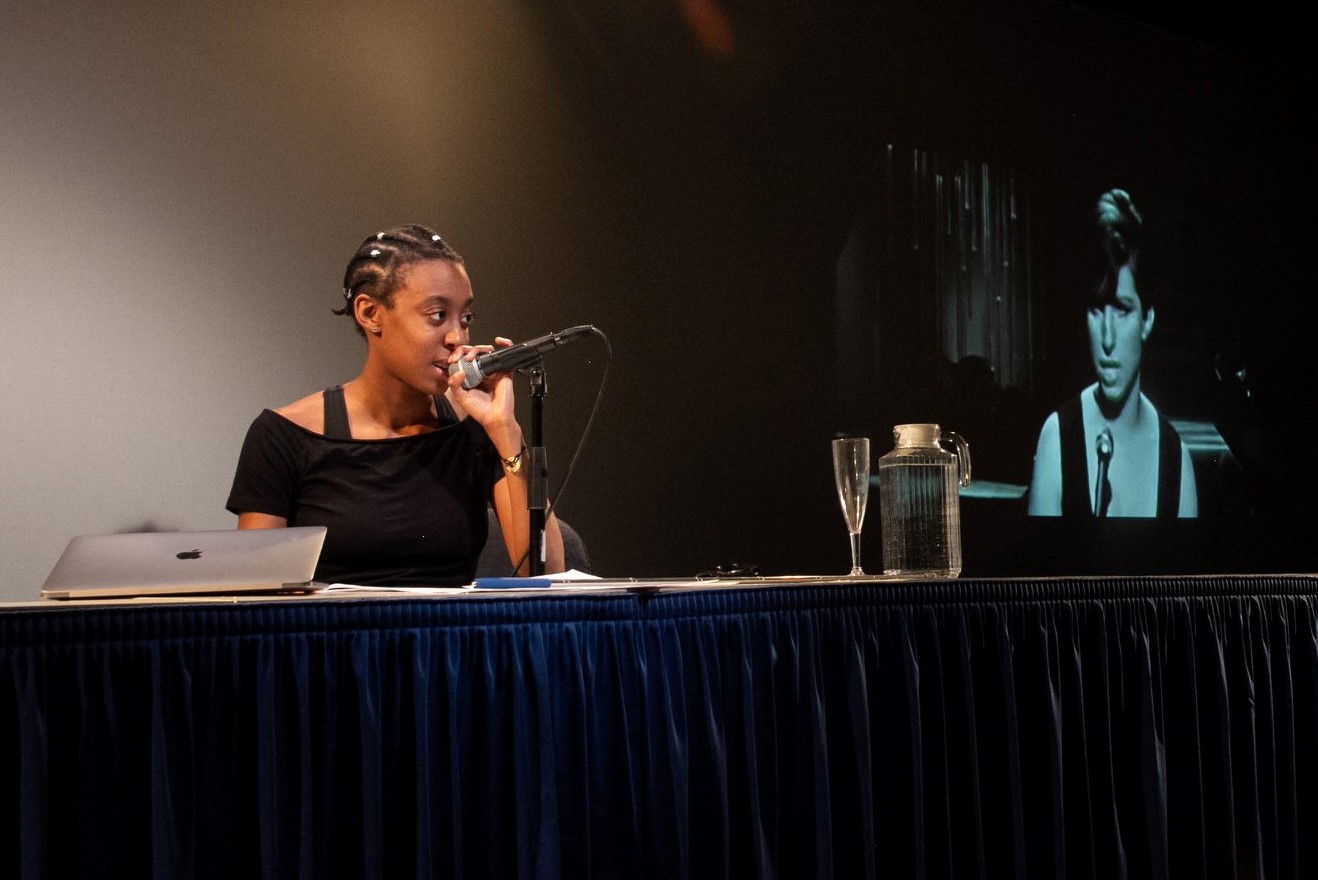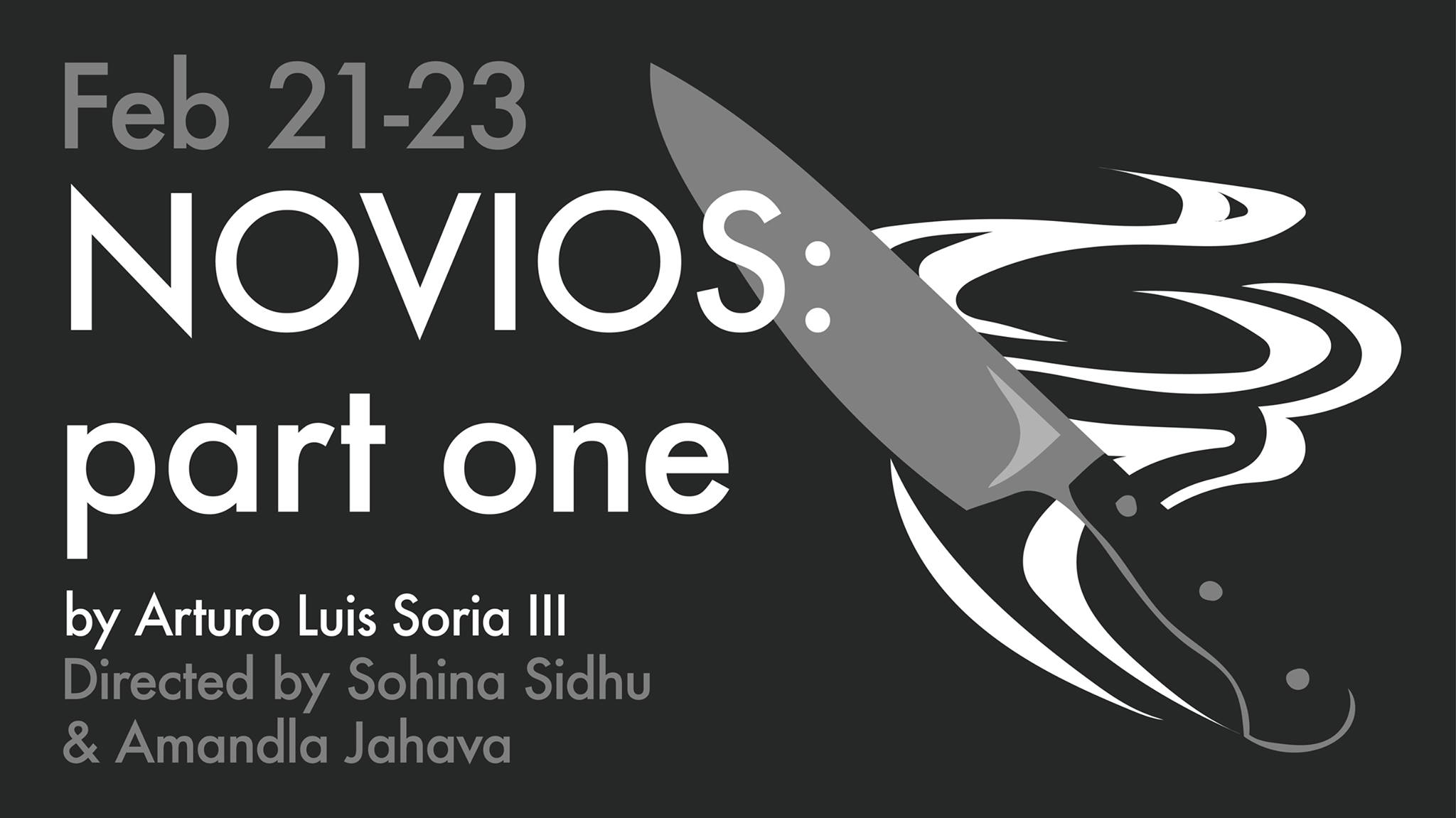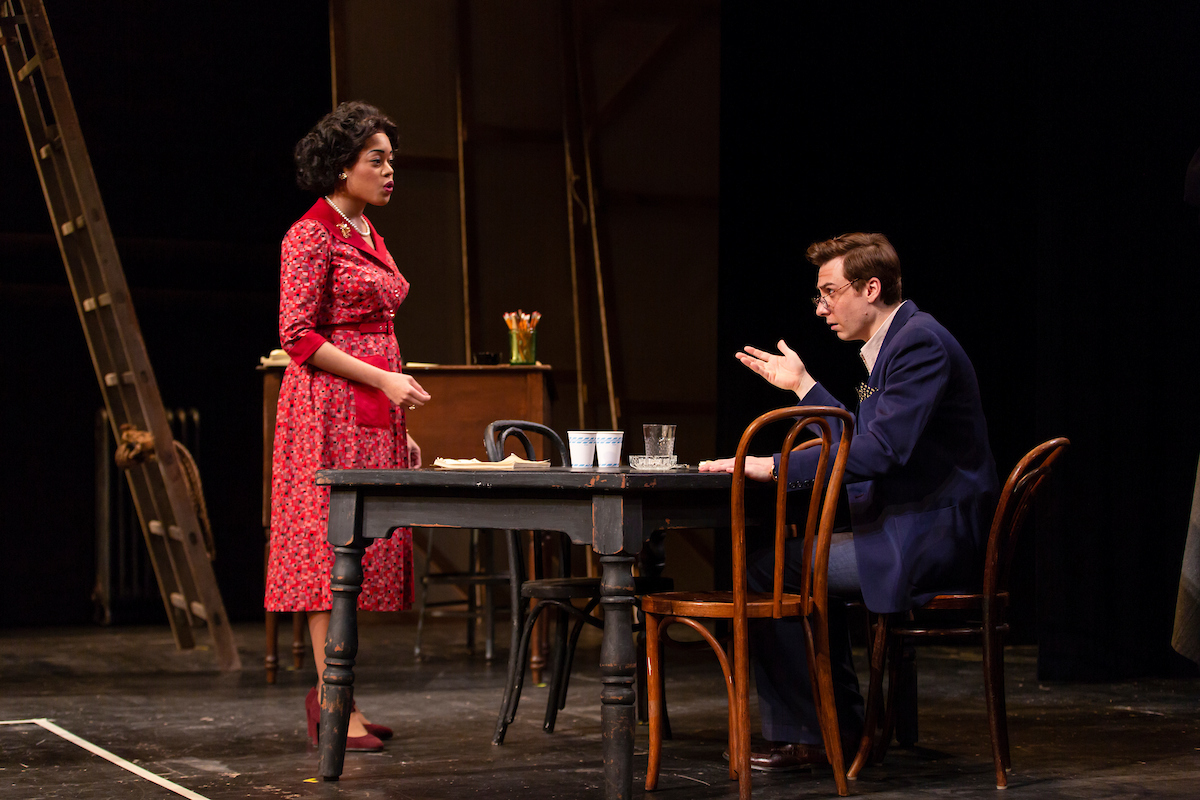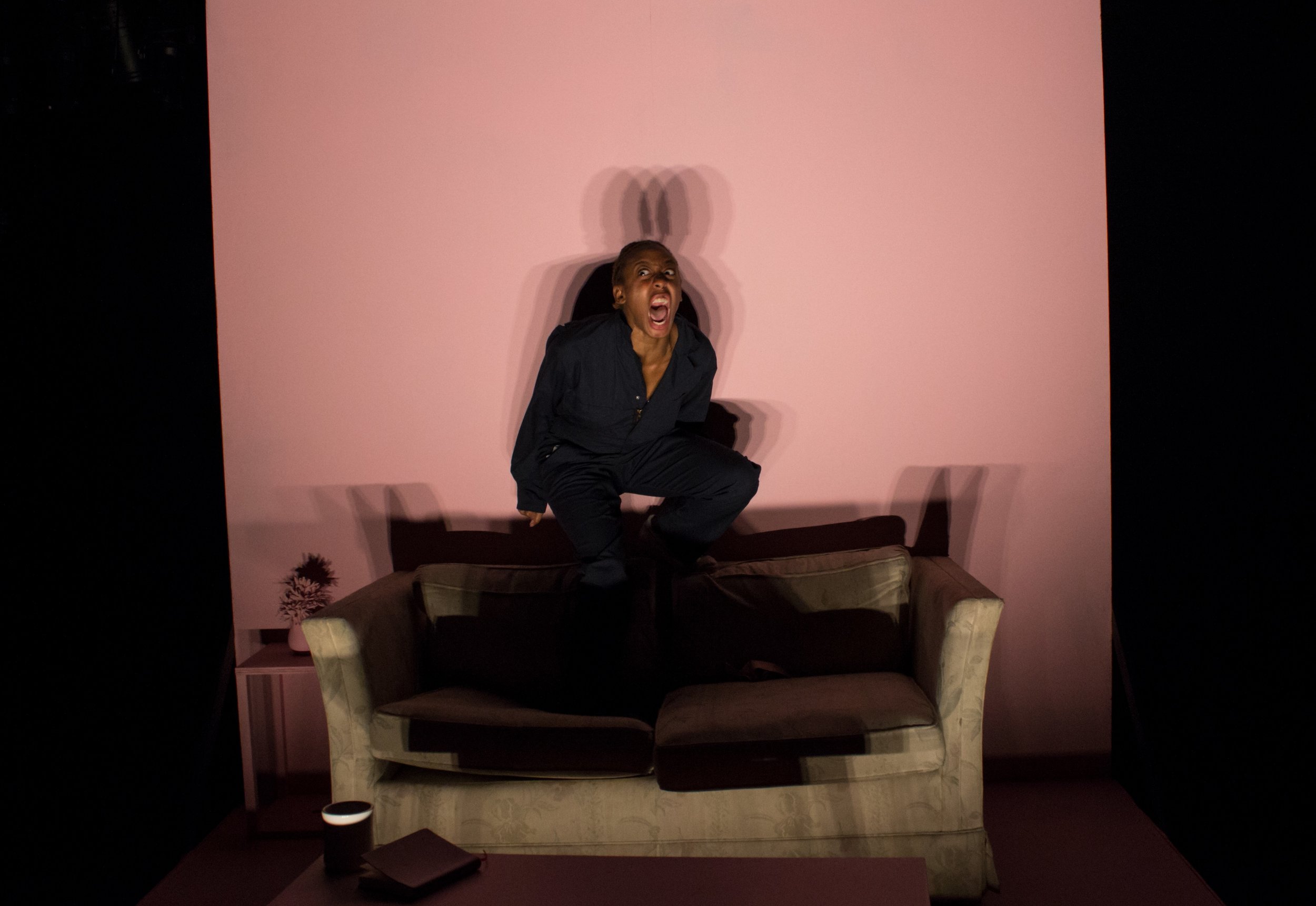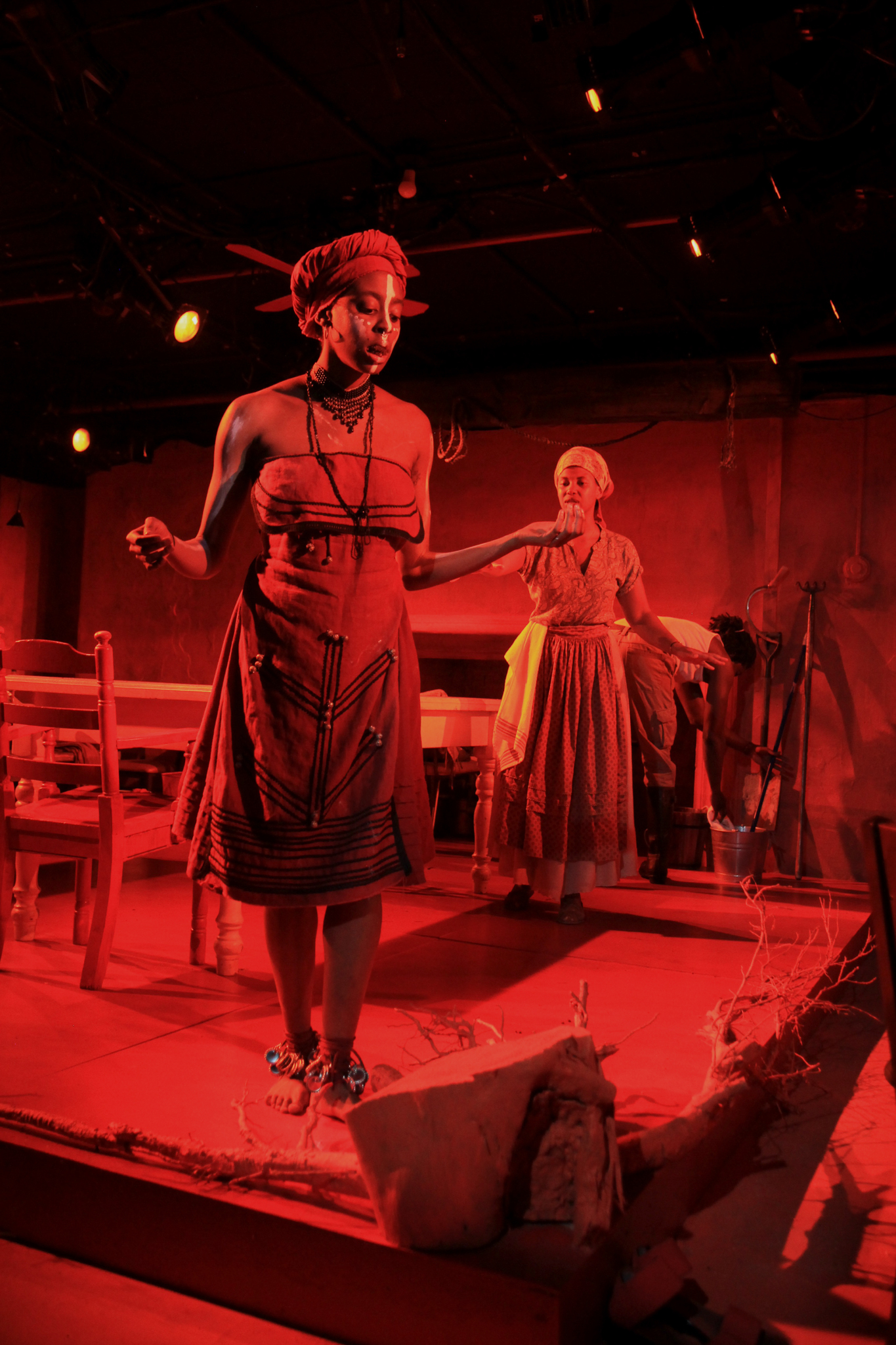Review of The Conduct of Life, Yale Summer Cabaret
Dysfunction reigns in María Irene Fornés’ The Conduct of Life, continuing at the Yale Summer Cabaret tonight through Saturday, directed by Jecamiah M. Ybañez. Fornés’ plays have a mysterious quality and a fascinating rhythm that works best in intimate settings, which makes the Cabaret a good place to see this provocative play.
Orlando (John Evans Reese) carrying Nena (Amandla Jahava) in the Yale Summer Cabaret’s production of María Irene Fornés’ The Conduct of Life (Photos courtesy of Yale Summer Cabaret)
The dysfunction is political, not only the naked bid for power in an unnamed country ruled by a military dictatorship, but, more directly, domestic, in the sexual politics of the household where a lieutenant named Orlando (John Evans Reese) lords it over his well-intentioned wife Leticia (Juliana Martinez). They have a friend in fellow officer Alejo (Devin White) who tends to laugh appropriately at Orlando’s sallies, while retaining, perhaps, more soul than Orlando. And Leticia is attended by a maid, Olympia (Nefesh Cordero Pino), who seems to stand as an emblem of the simple folk and is both an accomplice of Orlando and a confidante to Leticia.
Olympia (Nefesh Cordero Pino), Leticia (Juliana Martinez)
At first, the play might seem to offer a Chekhovian exploration of boredom, ambition and humiliation, but, importantly, there’s also Nena (Amandla Jahava), a young girl kidnapped by Orlando and held prisoner in a warehouse and later in the couple’s basement. The glimpses of rape and torture we get through Christopher Evans’ projections are harrowing, as if we were watching arty surveillance footage, but nothing we see quite equals in discomfort the sound of Jahava’s distraught whimpers and sobs. It’s unnerving.
Orlando, who opens the play doing calisthenics and giving himself motivational advice on how to climb higher among the brass, becomes an interrogator. In an early dialogue with Alejo, about a prisoner who died under questioning, Orlando prides himself on his brutal lack of sympathy. He seems the perfect man for the job, except perhaps too indifferent to outcomes. In other words, there are standards, even in dehumanizing tactics, and Orlando may be his own worst enemy. We get a fuller sense of his view of himself when we see him interact with poor, frightened Nena, a girl he picked up and forced himself on. It’s his need for her that drives Orlando, a passion for dominance that also dominates him.
Orlando (John Evans Reese), Alejo (Devin White)
The triangle between Orlando, Leticia and Nena is where Fornés’ interests lie, to let us see glimpses of darkly sadistic realizations of a family dynamic and to show us the powers that be and the powerless. In the latter view, Leticia is of interest as not quite either. She’s not the equal of Orlando, either politically or in terms of physical strength or cunning, nor is she as powerless as Nena is. An amazing scene late in the play comes when Nena and Olympia, who takes pity on the prisoner as well as showing a vicarious interest in her odd life, are at the table and are joined by Leticia, who asks “what are we talking about?” There sits wife, prisoner, and maid, and Fornés implies they might all easily be figures for the role of Woman in patriarchal society.
Leticia (Juliana Martinez)
And yet, in director’s Ybañez hands, the play never veers into outright allegory or satire. The sure-handed naturalism of the approach is greatly abetted by the way these actors—all current students at the Yale School of Drama but for Jahava, a recent graduate—inhabit their roles.
As Orlando, John Evans Reese brings a boyishness to the role that completely suits the small-time tyrant. He’s impetuous, sensitive of his dignity, needy, and erratic. As Alejo, Devin White has a cheery cynicism but late in the play shows more character. Juliana Martinez’s Leticia is a minor dame who might like to be a grande dame, helping the poor and trying to avoid the implications of her lifestyle. She might be seen as vapid, but Martinez brings a sullen gravitas to Leticia that makes her intriguing. Nefesh Cordero Pino plays Olympia with the knowing earthiness of those who have no illusions about what is necessary to get along in the world of their social superiors. And Amandla Jahava’s Nena is the heart of the play: the child as Christ, a girl who has introjected the selflessness of the sacrificial victim willing to suffer for others. Her views come out, in Jahava’s wonderfully fresh performance, as not at all deluded or debased.
Nena (Amandla Jahava), Olympia (Nefesh Cordero Pino)
The stage is a long marble-looking plinth stretching into a space near the Exit door that acts as the basement, foregrounding the couple’s house with a table and chairs and a phone-stand as minimal furnishings. The warehouse space is provided by videos so that we’re unaware of Nena’s predicament when they’re turned off, unlike other productions where the prisoner is visible throughout.
Told in short vignettes with blackouts, Fornés play maintains a somewhat arch tone toward the lives it asks us to contemplate. We don’t really settle in as we would with a more continuous structure, and that’s deliberate—to keep us guessing. The force of the situations propels the drama to its violent conclusion in this gripping play, but one senses that Fornés’ script would reward a slightly more quizzical rendering.
The Conduct of Life
By María Irene Fornés
Directed by Jecamiah M. Ybañez
Scenic Designer: Stephanie Cohen; Costume Designer: Alicia J. Austin; Lighting Designer: Daphne Agosin Orellana; Sound Designer: Bailey Trierweiler; Projections Designer: Christopher Evans; Dramaturg: Sophie Greenspan; Stage Manager: Amanda Luke; Intimacy Consultant: Sam Tirrell
Ensemble: Nefesh Cordero Pino, Amandla Jahava, Juliana Martinez, John Evans Reese, Devin White
Yale Summer Cabaret
June 21-29, 2019







